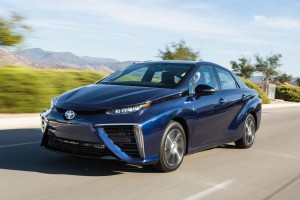
The defeat of a proposed 50% cut in petroleum use in California is unlikely to curb the use of greener vehicles, like the Toyota Mirai.
In a major setback for Gov. Jerry Brown’s climate agenda, the governor and legislative leaders in the California assembly have dropped, for now, an effort to require petroleum use in motor vehicles to be cut in half by 2030.
The bill, authored by Senate President Pro Tempore Kevin de León and Senator Mark Leno, called not only for a 50% reduction in petroleum use in cars and trucks, but it also mandated a 50% increase in energy efficiency in buildings and for 50% of the state’s utility power derived from renewable energy, all by 2030 that Brown set out in his inaugural address in January.
The elimination of that proposal, which was part of a larger bill, followed weeks of lobbying by oil companies and resistance not only from Republicans, but also moderate Democrats in the Assembly.
The measure was part of legislation designed to curb greenhouse gas emissions over the next 35 years. It passed the Democratic-controlled Senate, but was challenged in the Assembly, where moderate Democrats from economically challenged areas, such as the state’s Central Valley, are a significant force within the Democratic caucus.
Lobbyists for the oil industry, led by the Western States Petroleum Association, launched a major campaign to block the legislation, which called for reducing the use of petroleum by 50%. The campaign featured series of advertisements, charging the bill could lead to fuel rationing and bans on sport-utility vehicles.
Backers described those allegations as false — the bill does not mention rationing or any other specific measures — but those arguments seemed to go far in coalescing opposition to the bill. The decision on how to carry out the proposed cuts would have been left to the state’s Air Resources Board, a matter of strong concern to many lawmakers.
CARB’s existing authority to force carmakers to mandate the sales of more electric vehicles in California and curb the use of diesel engines was not altered by the legislative defeat of Brown’s proposal to reduce the use of petroleum. Nor will it relieve the pressure on automakers to build cleaner vehicles, the board currently exerts.
(2016 Chevy Volt will see slow, limited launch. For more, Click Here.)
In fact, Brown has made efforts to address the impact of climate change a priority of his administration, said he will push forward on curbing greenhouse gas emissions using his executive authority. Even with the proposal to reduce the use of petroleum has been stripped out of the proposed legislation; the language of the bill will preserve the California Air Resources Board’s existing power to make regulations that reduce emissions, according to the Los Angeles Times.
“This has helped the cause of clean energy,” Brown maintained afterwards.
When California conservatives pushed a 1978 ballot measure known as the Briggs Initiative to prevent gay people from working in public schools, it backfired and public support began to swing in the other direction, he recounted.
“That opened up the legitimacy of that debate,” Brown said, and helped get the ball rolling for gay rights.
(Click Here for the details about the challenges facing the 2016 Toyota Prius.)
Brown said he believes the petroleum industry’s opposition to climate legislation will also ultimately lead to a shift in political debate in favor of similar legislation.
“We got a big brouhaha, and it’s the beginning of many more brouhahas,” Brown said.
California’s climate bill package supporters included Los Angeles Mayor Eric Garcetti, the American Lung Association, the Environmental Defense Fund, the Sierra Club, the Natural Resources Defense Council, and many other clean energy businesses, contractors, and campaigns. Supporters also noted state would have a decade and a half to transition part of its motor vehicle fleet from the internal combustion engine, which could be feasible with tax incentives and other techniques.
(To see how falling gas prices saved drivers $1.4 billion, Click Here.)
California Assembly recently did approve a that prompts public employee pension funds to divest from coal by July 2017, which indicates the environmentalists still have substantial influence in the state’s legislature.

Just pulling meritless numbers from their orifice is typical governmental incompetence. See Obama and the EPA for other pulled-from-their-orifice decrees such as 54.5 mpg CAFE mandates which have zero science behind the arbitrary mpg requirements.
Few people are opposed to improving the environment. Most people however desire a sound, rational, achievable goal and program that best serves all involved not just the flat earth EV shills and tree huggers who are by far the minority.